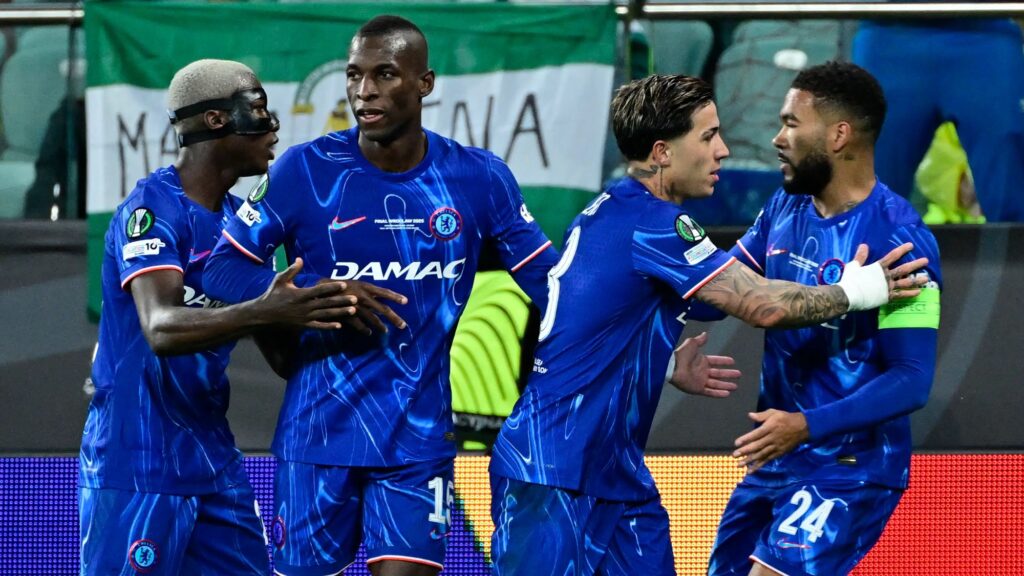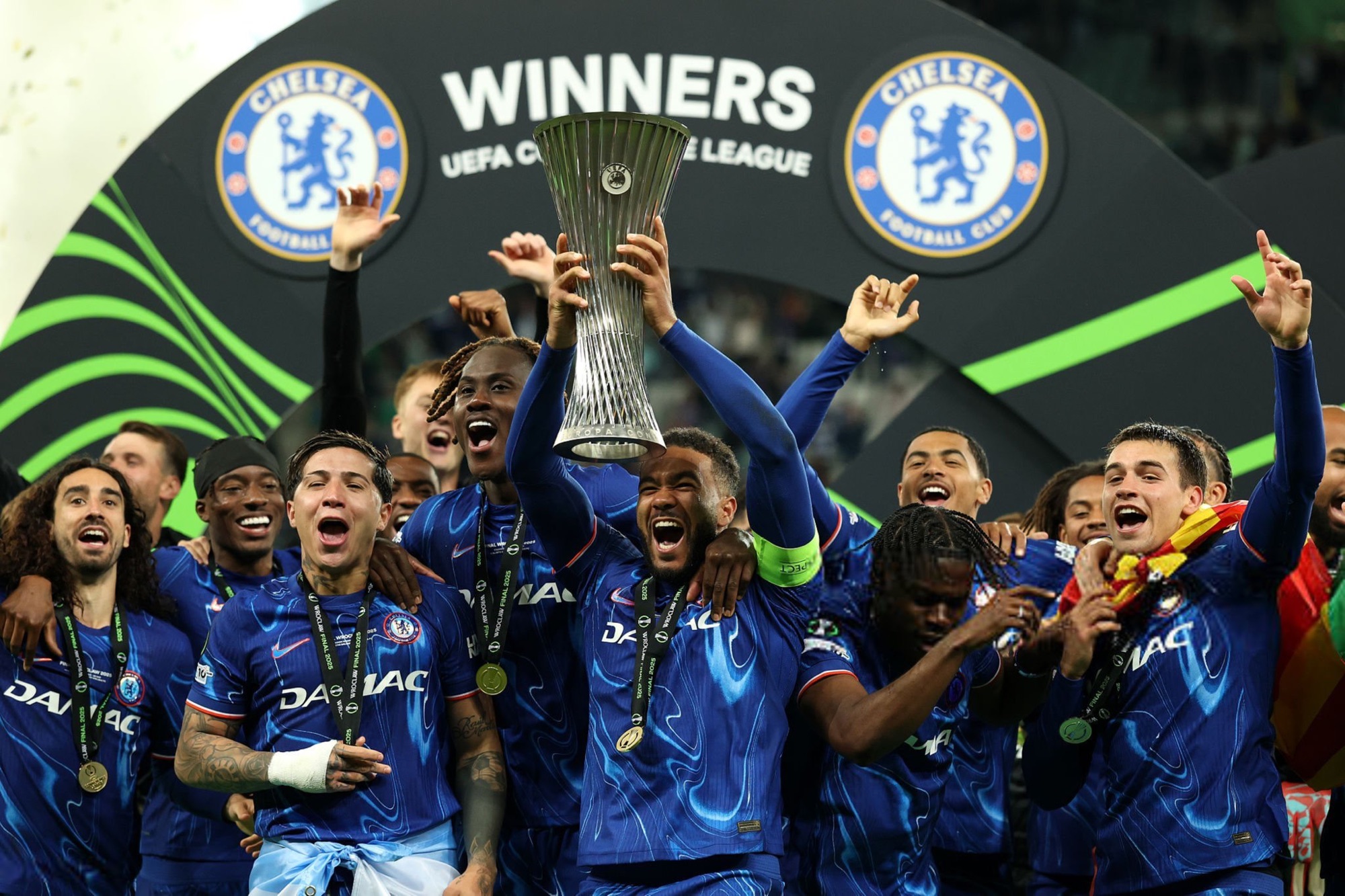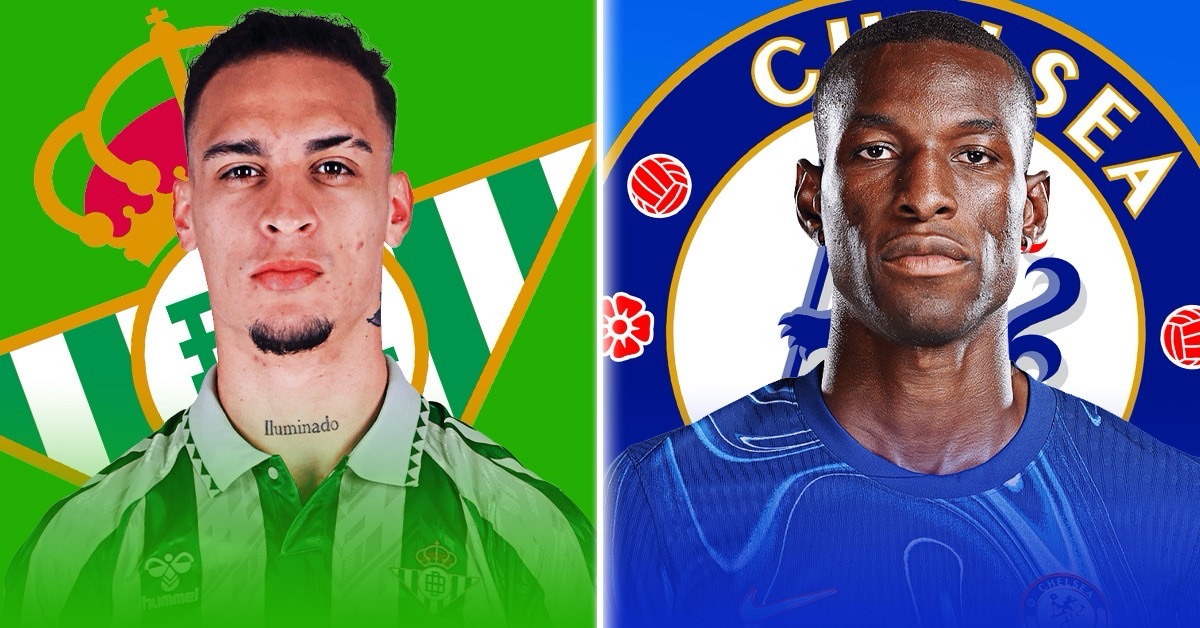Chelsea have completed the European set. We’ve won it all…
An aggressive, dominant second-half performance inspired a comeback of the ages.
Enzo Maresca’s young Chelsea side completely turned the game around to win the missing piece of the European trophy puzzle – the Conference League.
Chelsea lined up with a shuffled side from the team that scraped a vital 1-0 win over Nottingham Forest just three days before the final.
Jorgensen, Badiashile, Chalobah, Gusto, and Jackson were the five changes to Maresca’s first major tournament final line-up.
Fans on social media questioned the missing captain, Reece James, the progressive passer in Levi Colwill and the immediate reintroduction of the striker-turned-villain Nicolas Jackson.
Their frustrations proved to be well-founded in the first half, but the second was anything but, scoring four goals to capture the trophy.
Maresca’s In-Game Adaptation: Persistence Meets Pragmatism
Enzo Maresca’s pre-match setup stuck to his blueprint: inverting Malo Gusto into midfield during build-up.
It has worked a treat when Reece James or Moises Caicedo are the inverting players – two with elite midfield experience.
This is not the case for Malo Gusto. A marauding wing back is not accustomed to the demands of a high-pressure central role and Betis pounced.
Pressed into a central error by Isco inside just ten minutes, Chelsea conceded early, and the flaw was exposed.

The five-time European champion found Moroccan winger Abdessamad Ezzalzouli who scored a driven shot across Jorgensen in the Chelsea net.
Maresca persisted with his inversion which saw a glimpse of output as just two minutes later Gusto tried a very similar pass from an inverted midfield position, and it led to a Chelsea attack that broke through Betis’ press.
The attack came to nothing but was a typical example of Maresca’s philosophy stubbornly bearing some fruit in the face of criticism.
The remainder of the half saw the inversion continue with multiple chances for Ezzalzouli to attack the space left behind and a couple of occasions saw Chelsea fans grateful for the defence efforts of Trevoh Chalobah in the channel.
Betis boss and Maresca’s “football Dad” Manuel Pellegrini clearly sought to capitalise on Maresca’s stubborn build-up tactic by leaving Ezzalzouli high up the pitch, occupying Gusto’s vacated space.
Maresca didn’t abandon his principles. Instead, he adjusted who executed them.
The half-time substitution of Reece James wasn’t just a response to Gusto’s struggles.
It was a calculated leadership injection. Within seconds of stepping on, James led a team huddle.
Minutes later, he calmed possession, completed dangerous entries into the final third, and helped nullify Betis’ threat down Chelsea’s right.
Crucially though, the system remained and instead of Maresca tearing up his notes – he simply upgraded the player executing them.
The structure stayed. The personnel improved. And so did the performance.
Tactical Discipline in the Second Phase and Press
The first half was disjointed. Enzo Fernandez was stationed high, barely involved. The wingers — Madueke and Neto — were timid and tentative.
Real Betis simply looked too comfortable narrowing the pitch and baiting mistakes.
Then came the reset. James brought leadership immediately – something fans and Maresca-alike have criticised him for a lack of.

TNT Sports’ cameras even spotted James demanding his teammates join him for a huddle in which he clearly demanded more from the team.
Chelsea’s second-half press was much more aggressive and synchronised.
Madueke and Sancho tracked back with energy, whilst Palmer stayed in the right-half-space and gambled against Ezzalzouli’s teenage replacement, Jesus Rodriguez.
Caicedo offered security while Enzo remained advanced. But this time, the plan worked.
Chelsea began winning the ball higher and skipping the build-up phase altogether.
Chelsea entered the final third 58 times to Betis’ 37. It was a second-half performance less about recycling possession and more about seizing initiative in the press.
It meant it was the Spanish side’s turn to feel rattled and flustered. Chelsea dominated then on.
Palmer and James’s Game Intelligence made the ultimate difference
Cole Palmer is best known for flair and finesse. But his reading of the moment may have been the most decisive factor.
Identifying an inexperienced opponent late in the second half, he isolated and attacked his man, producing a devastating cross for Jackson.

CP knew he was up against a teenage winger defending him and decided to gamble the percentages and It paid off.
He was able to deliver a sumptuous cross to the shoulder of under-fire Nicolas Jackson, who tucked home, even if by unusual means.
Take nothing away from Palmer’s delivery for the first goal either though, assisting Enzo Fernandez with a curling ball who did well to head past goalkeeper Adrian.
All too often this season we’ve seen Palmer’s excellent efforts go without reward as chance after chance goes begging.
This time, a lack of clinical finishing was nowhere to be seen, and yet another goal from Enzo Fernandez by the way.
The player fans were demanding to be moved deeper, scoring from a high position, once again.
Reece James deserves equal credit. His second-half impact can’t be captured by stats alone.
A visible team talk, stern instruction during celebrations and a re-focusing of a young squad that could have easily crumbled under pressure.
Maresca has often been questioned for tactical rigidity. But this was the night where his method survived the moment.
His players, led by his captain and standout creator, made it count.
In the second half, players looked focused, determined, almost desperate to do their jobs properly.
Where’s that naivety and inexperience people are constantly talking about? This was not a naive performance by any stretch.
Perhaps the players chosen to start or their attitudes were naive.
A young squad with a manager still finding his feet on the highest stage can be forgiven if they spot and correct their errors like our Italian boss did in Wroclaw.
Much has been made of Maresca’s insistence on inverting a full-back but his stubborn approach bore fruit as a tweak in Chelsea’s aggression saw us win possession higher, avoiding the need for a build-up altogether.

Jadon Sancho gave the hierarchy a massive decision to make
Loanee Jadon Sancho came in for Pedro Neto, at half time, who performed poorly.
Sancho’s season has been stop-start, mainly due to lacking in consistent contribution in goals and assists.
With his transfer situation still up in the air and the higher-ups at Chelsea rumoured to be undecided on making his move permanent from the terrible Manchester United, he needed to deliver. Did he? Yes, and then some.
Sancho worked hard, kept hold of the ball, demanded it from his teammates and his confidence paid off.
A smart finish followed to make it 3-1, reminiscent of his goal to start the comeback at Spurs in December, as well as his curling effort at home to Ipswich Town.

There haven’t been enough moments like this to make the decision on whether he stays or goes more obvious, but if this was Sancho’s last game in blue, it was the perfect send-off.
Overall, the stats showed a massive improvement in the second half and reflected all points I have said.
In the first 45, Chelsea’s xG was 0.10 with zero big chances created.
Words at the interval inspired an upturn in fortunes, as well as a shift in tactics, whilst keeping the same system.
We ended up seeing four big chances created and an xG of 1.21, as ruthless finishing lead the way to glory.
It was perhaps all too fitting that double player of the season winner Moises Caicedo secured the victory with the fourth goal.
Chelsea have now completed the set. Champions League, Europa League, and Conference League, as well as the UEFA Club winners cup and UEFA super cup.
A record to be proud of and bragging rights for the fans. Maresca’s young side showed steel, swagger, and tactical resilience under pressure.
These are the qualities of elite teams. Could that suggest this might be the first of more to come?




